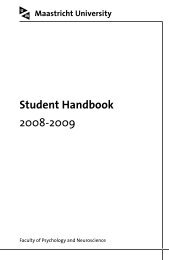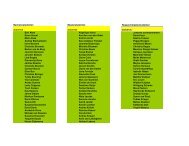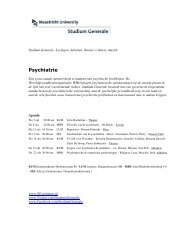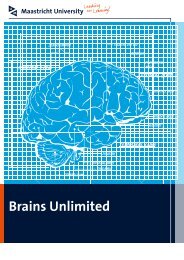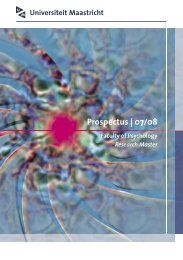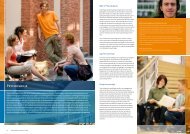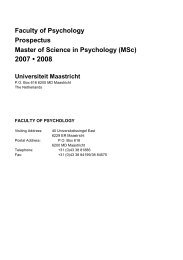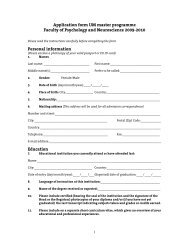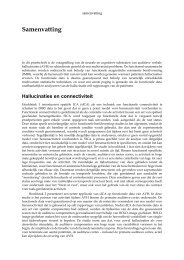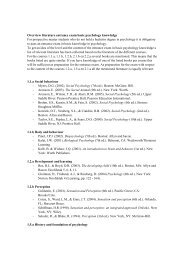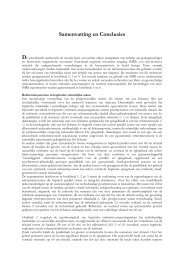Prospectus | 08/09 - Psychology and Neuroscience - Maastricht ...
Prospectus | 08/09 - Psychology and Neuroscience - Maastricht ...
Prospectus | 08/09 - Psychology and Neuroscience - Maastricht ...
You also want an ePaper? Increase the reach of your titles
YUMPU automatically turns print PDFs into web optimized ePapers that Google loves.
Chapter 5 - Specialization Psychopathology<br />
the two lectures, students will do a short practical, consisting of three meetings. During<br />
these practical sessions they will work with PsychMate, a program that is especially<br />
designed to acquaint students with various computerized paradigms from cognitive<br />
<strong>and</strong> social psychology. Students will work in groups of two. The assessment consists of<br />
short assignments that are done during the practical session, <strong>and</strong> one final paper that<br />
consists of a critical evaluation of a paradigm of choice.<br />
Form of Assessment<br />
Short practical assignments.<br />
111<br />
| 493PP Research Theory <strong>and</strong> Designs – 1 credit<br />
Coordinator: Arnoud Arntz, Clinical Psychological Science (FPN), Phone 38 81606,<br />
50 Universiteitssingel, Room 1.3<strong>08</strong>, E-mail: arnoud.arntz@MP.unimaas.nl<br />
Description of the Course<br />
The aim of the workshop is to provide students a good underst<strong>and</strong>ing of the<br />
theoretical <strong>and</strong> practical issues of different designs that are used in the domain of<br />
psychopathology.<br />
This workshop will elaborate on basic issues of theory <strong>and</strong> methodology of scientific<br />
research in the field of psychopathology. There are four sessions. The first session is<br />
devoted to qualitative research methods <strong>and</strong> advanced small-scaled case series designs.<br />
The second session will focus on experimental designs to test causal hypotheses<br />
derived from theories of psychopathology. The third session will cover advanced<br />
correlational designs, including prospective designs, with special reflection on the issue<br />
to what degree such designs can determine causality. The last session deals with the<br />
design of treatment outcome studies, focusing mainly on r<strong>and</strong>omized clinical trials.<br />
Instructional Approach<br />
Interactive discussions under the leadership of research faculty with special interest in<br />
the topic.<br />
Form of Assessment<br />
Exam with open questions.<br />
| 4<strong>09</strong>RM Research Ethics – 1 credit<br />
Coordinators: Eef Theunissen, Neuropsychology & Psychopharmacology (FPN),<br />
Phone 38 81940, 40 Universiteitssingel East, Room 2.743,<br />
E-mail: e.theunissen@psychology.unimaas.nl<br />
Description of the Course<br />
Students will learn to think critically about ethical dilemmas that psychologists<br />
encounter when exercising their profession. This workshop will discuss legal <strong>and</strong> ethical



